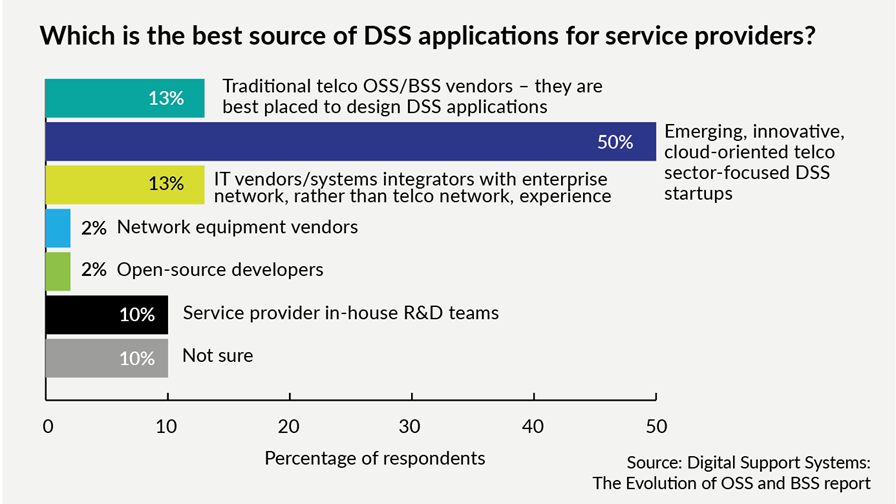
- Telcos need new software systems to run their next-gen networks and perform their monetisation and customer engagement tasks
- We asked our DSP Leaders Council members a broad range of questions about the shift to DSS solutions for our ‘Digital Support Systems: The Evolution of OSS and BSS’ report
- They believe cloud-oriented startups, rather than incumbent OSS and BSS suppliers, are best placed to provide DSS systems to network operators
Traditional OSS and BSS software system vendors have a lot of work to do if they are to be regarded as the premium providers of next-generation telecom software tools. That’s one of the key takeaways from the recent DSP Leaders report, Digital Support Systems: The Evolution of OSS and BSS.
The transition to, or at least addition of, next-generation software systems that support a service provider’s day-to-day operations and business functions is absolutely critical to telco strategies but often gets sidelined or treated as an afterthought. Traditionally – and indeed currently, for the most part – these functions and processes are supported by OSS (operations support system) and BSS (business support system) solutions for network and service assurance, inventory management, fault management, provisioning and activation, billing, rating, customer relationship/experience management, fraud management, and much more. But as network operators shift to more automated cloud-oriented, software-based and virtualised platforms, traditional OSS and BSS systems fall short in terms of efficiency, scale and functionality, and a new breed of tools is needed – digital support systems (DSS).
This term encompasses the next generation of OSS and BSS systems, though it should be noted that the term digital enablement system (DES) is also being used to describe next-gen BSS applications.
Having hosted the Digital Support Systems Summit in April 2024, the team here at TelecomTV decided to ask the members of our DSP Leaders Council about various aspects of the transition from OSS and BSS to DSS. We conducted a survey in August and received responses from 40 council members who work at network operators (including some of the biggest telcos in Asia, EMEA and North America), major and specialist vendors, industry bodies and research companies. All of the respondents command CXO or other high-level roles in their organisations.
One of the questions we asked was: Which is the best source of DSS applications for service providers? We asked this specifically because as telcos shift to more cloud-oriented, virtualised platforms and adopt telco-to-techco strategies, more and more IT and software-as-a-service (SaaS) vendors are finding themselves relevant to the service provider community and, especially as AI starts to play a bigger role in day-to-day operations, new companies are entering the telecom software sector.
As you can see from the chart above, the survey results delivered a very clear message that is very positive for the newcomers but will come as a hammer blow to the traditional OSS and BSS vendors, as only 13% of our councillor respondents believe them to be the best source of DSS tools.
For the new breed of DSS developers that have skipped or abandoned the legacy era and are offering solutions that are developed from the ground up for cloud-enabled horizontal platform deployments, though, the results offer great encouragement, as half of our councillors believe that ‘Emerging, innovative, cloud-oriented telco sector-focused DSS startups’ are the best source of DSS tools for the telcos.
Surprisingly, ‘IT vendors/systems integrators with enterprise network, rather than telco network, experience’ attracted the support of only 13% of our respondents, while ‘Service provider in-house R&D teams’ attracted 10% of the votes, which is quite respectable in many ways and a sign of the ‘techco’ times. Network equipment vendors, so long a major source of many OSS tools, hardly got any support at all – that will also be a wake-up call for them.
This was just one of 12 questions we put to our DSP Council members – we also asked about the impact of AI, the importance of industry bodies such as the TM Forum, cloud strategies for DSS and, of course, whether telcos even need DSS solutions (spoiler alert – the answer, in a nutshell, was ‘yes’).
The 16-page Digital Support Systems: The Evolution of OSS and BSS report is available to download for free here.
All of our DSP Leaders reports – including those focused on AI’s impact on the RAN, telco network API strategies, quantum-safe networking, Open RAN, and our latest 36-page publication that focuses on the role of the RAN intelligent controller (RIC) – are available to download for free: You can find them all here.
- Ray Le Maistre, Editorial Director, TelecomTV
Email Newsletters
Sign up to receive TelecomTV's top news and videos, plus exclusive subscriber-only content direct to your inbox.




